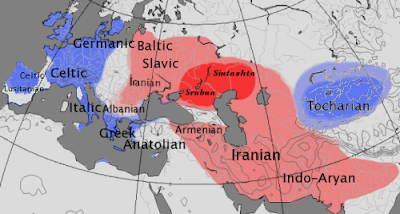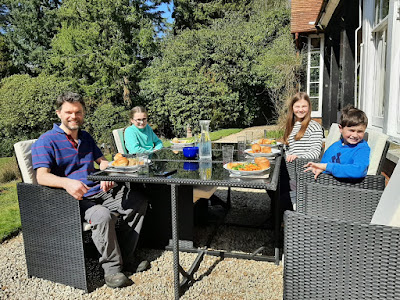Lois put her back out in bed last night - she's going to listen to her sect's two worship service today on mixlr on her phone, so she can be invisible to the other sect members and can walk about while she's listening. That's something it's more awkward to do on zoom, when everybody can see you - oh dear!
We get a couple of pictures and a text from Sarah, our daughter in Perth, Australia. It shows Sarah and Francis's 7-year-old twins Lily and Jessie having an exciting day. Lois and I paid for Sarah to buy them chocolate Easter eggs, and that's one picture. The other picture is of them just about to investigate what the Easter Bunny brought them last night. How wonderful to still believe in the Easter Bunny!
I'm trying desperately not to lose the thread of Anthony's argument and above all his chronology. Essentially he's saying that the Indo-European language, which was the ancestor of virtually all European and Indian languages, and of Iranian, can be thought of as having ceased to exist in a homogenous form by 2500 BC at the very latest, because the people who spoke it were already dispersing from the homeland in the Steppes and starting to speak different "daughter languages" slightly different from the original "mother languages".
It's interesting what little clues language experts make use of in order to date these sorts of divergences and to date when various groups left the homeland in the Steppes to find their own bit of territory somewhere else in Europe or Asia. An important bit of evidence is the word used to mean "one hundred".
The word for "one hundred" that we use today is thousands of years old, and is basically the same word (with minor variations) in all the European, Indian and Iranian languages: with one difference: - the Indian, Iranians and Slav and Baltic languages and one or two others have changed the initial letter to an "s". So the languages that haven't made that change, i.e. all the others, e.g. Greek, Italian, Welsh etc probably left the Steppes homeland at a relatively early stage, and as a consequence didn't realise they were supposed to make the change to an "s" when the ancestors of the Russians, Indians, Iranians decided to go for it.
This is what language experts call "the centum-satem split".
the "blue peoples" left the Steppes homeland too early, and missed out on
the exciting new initial letter ("s") later introduced for the word for "one hundred"
in the Iranian, Baltic, Slav, and Indian languages
Fascinating stuff!!!
16:00 We have a cup of tea on the sofa and speak on the phone to our other daughter, Alison, who a couple of weeks ago moved into a new house in Headley, Hampshire, with Ed and their 3 children. The house is a rambling old Victorian house which needs loads of updating and refurbishment - oh dear!
The family has been having a special Easter meal from CookShop today and sitting outside to enjoy the mildish weather: roast lamb, potatoes, Yorkshire pudding, carrot, greens and stuffing, with sticky toffee pudding for dessert.
(left to right) Ed, Rosalind (12), Josie (14) and Isaac (10)
The school holidays began on Friday and will last 2 weeks. The children are still going to their old schools 7 miles away, but the schools are now on the other side of the county boundary, in Surrey, so the children have to pay to go on the school bus. Hampshire County Council have refused to subsidize them, so Ali and Ed have to pay for tickets. Shame on you Hampshire, how small-minded can you get !!!!
There's a lot of work on the house to plan and to pay for, but we think Alison is relishing it as a nice 10-year (at minimum!) project. My god! They're planning to install wood pellet central heating, which I've never heard of, but it's apparently very environmentally friendly. What a crazy world we live in !!!!
The family are hoping to get a 4 foot fence put round the house's extensive 6 acres of grounds this week, to keep their Danish dog Sika in, although it won't keep the deer out unfortunately. Six foot fencing would have been better but it's more expensive of course.
Yesterday Alison was sitting in the lounge thinking about what she could do with the kitchen and also "marvelling at the large single-glazed windows that we will need to redo at some point", as she says. And she put this photo up on "Insta":
the photo that Ali took yesterday while sitting in the family's lounge
What a house - the mind boggles!
We're hoping the family can visit us for the day next Saturday, weather and coronavirus lockdown restrictions permitting, which will be great - we haven't seen them for months sob sob! We plan to have a meal with them in our back garden. How wonderful will that be - my god!!!!
Alison started a part-time job as a teacher in the new year, and she has been offered a first coronavirus jab - she has to drive down to Portsmouth on Friday to get it but she's more than happy to do that, needless to say!
Our daughter Alison needs to drive down to Portsmouth on Friday
to get her first coronavirus vaccination
I don't know if Alison will be getting the Pfizer or the Astrazeneca vaccine - you have to take what they give you! Incidentally, I've just seen that Keith Allum has been active on the quora website giving his two-pennorth about what is going on overseas with the fuss about Astrazeneca.
the Jenner Institute, Oxford, where the astrazeneca vaccine was developed
This is just Keith's opinion of course, I don't know if he's right.
He says, for instance, that there's no interest or appetite in Germany - home of
BioNTech - for promoting a dirt cheap competing vaccine that yields
comparable real-world results at tenth the cost and minus insanely cold storage
and complex cold-chain supply and preparation requirements.
And in France the Pasteur Institute vaccine - a classic nationalistic
‘grand project’ failed, and an alternative, non-indigenous (licensed) vaccine
is only expected to start volume production a year later, in early 2022. This, for obvious reasons not only made a successful and inexpensive British vaccine politically
unacceptable but an ongoing insult.
But is Keith right? I'm no expert needless to say. So the jury's still out on that one!
But fascinating stuff !!!
20:00 We watch a bit of TV, the second episode of a new series charting the life of Winston Churchill.
Churchill's career certainly had more than its fair share of ups and downs, that's for sure. This second episode takes us through Churchill's period as First Lord of the Admiralty during World War I, a job he was sacked from, after the fiasco of the Gallipoli campaign against the Turks. The programme ends with the post-war rehabilitation of his reputation and inclusion in the post-war Cabinet.
Lois and I are already very familiar with a lot of the details of Churchill's career during these years. However we are fascinated by some of the photos of Churchill from this period, many of them recently discovered and shown here for the first time.
1915 - a portrait of Churchill in sombre mood, taken shortly
after he is sacked from his job as First Lord of the Admiralty
1916 - photo of Churchill after he fails to get a cabinet post with
the new Prime Minister, David Lloyd George
1918 - all smiles now, when Churchill gets the offer of a job
in Lloyd-George's first post-war cabinet
Lois and I didn't know that Churchill argued successfully with Lloyd-George over the treatment of Kaiser Wilhelm at the end of World War I. Lloyd-George wanted to press for the Kaiser's execution, but Churchill advocated magnanimity in victory, and in the end Kaiser was forced to abdicate, and he lived out his life in exile, dying in 1941.
21:00 We go to bed on a lighter note, the first ever colour edition of the Sunday night variety show, "Sunday Night at the London Palladium", from 1966.
Some interesting guest stars tonight, including Roy Orbison, and the Australian group The Seekers. The Seekers were at this stage still more of a folk group than a pop group - they announced that they were going to sing a song written for them by Paul Simon, who at that time wasn't particularly well-known in the UK.
Roy Orbison sang what he said was his latest release, "Twinkle Toes", which neither Lois nor I have ever heard before. We checked on the internet, and it seems that Roy's days of big hits were over by 1966, although he had a bit of a resurgence much later, in the 1980's.
Oh dear, that's life in the show-business world. Fame doesn't last for ever always, sadly!!!
Poor Roy !!!!!!
22:00 We go to bed - zzzzzzzzz!!!!!


















No comments:
Post a Comment